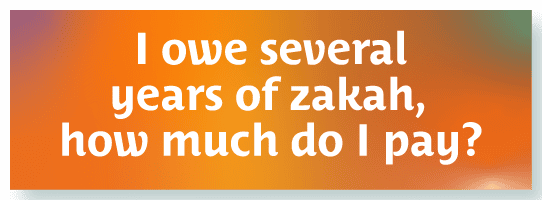

Many of us use Ramadhan as an opportunity to fulfil our Zakah for the year. This great pillar of Islam not only serves to purify our wealth but rebalances the need in society so those in need are taken care of with dignity and honour.
While there are great many areas of need around the world, the heart of Zakah has often been overlooked: that is, to serve the near before the far. Far from news headlines and public broadcasts, our community has a silent phenomenon of highly vulnerable men, women and children who are silently struggling through extreme hardships. We will rarely hear of their plight, and their stories are not attention-grabbing enough to make it on a public platform, but the need is beyond question.
Zakah is a proof of our community solidarity, as we use it to uplift those who are struggling to find relief. From the single mother in crippling debt, to the prisoner family facing isolation and stigma and the elderly uncle who must choose between whether to heat or eat, Zakah returns dignity to the worst suffering.
When we consider the purpose of Zakah, we appreciate why Allah mentions it alongside Salah, another foundational act of worship: both carry innumerable benefit to the individual and society- reminding us of our obligations to Allah, ourselves and others. Embrace carries the weight of this responsibility on your behalf, to seek out and serve the beneficiaries that often languish in anonymity.
Your Zakah will find few avenues as unique and urgently needed as for these families on our doorstep. Your Zakah will bring direct and lasting relief for those who are close to home, yet too often overlooked.
"Charity (Zakah) is to be collected from the rich (members of a community) and distributed amongst its
poor."
(Bukhari and Muslim)
With so much turmoil taking place across the world, it is easy to feel those most deserving of our Zakah are those abroad; for, surely, how needy can Muslim families in the UK really be? But right on our very doorstep, mothers struggle with rent and bills, households are strangled by debt and children suffer in silence as they go without. The staggering reality is that 13.6% of UK households - more than 7.2m people - experienced moderate or severe food insecurity this year, 6 million are in deep poverty and 3.8m are destitute. Those seeking asylum, are forced to live below the poverty line, some receiving as little as £9 a week. Even the basic rate of Universal Credit leaves families below destitution thresholds.
"I swear I don't have any clothes to wear. I borrowed the jacket from my friend in the room. I am talking to you and my eyes are tearing up from the oppression I am living."
Whilst not widely known, the scholars of the four classical schools of thought (madhahib) are in agreement that the most deserving recipients of zakah are actually those in your own country and that Zakah should not be paid past the distance from which you would begin shortening your prayers. One of the undisputed conditions of Zakah is to seek the most deserving families from among your local communities. Imam Ash Shafi'i went as far as to say if you pay Zakah outside your local community it is not accepted as Zakah and must be paid again; whilst Imam Abu Hanifah said it is only permissible to send your Zakah abroad after the explicit permission from the governor of your land.
"I was raided twice in 6 months... They took my money, which was not given back, which was for me to pay my basic needs, my rent and things, as I did not yet have benefits at that time. So I was left without any penny, in a very distressful situation."


“Zakāh expenditures are for the poor, the needy, those
employed to collect it, those whose hearts are subject to reconciliation, those in
captivity, debtors, those in the cause of Allah and the traveller – an obligation by Allah.
Allah is Knowing and Wise.”
(9:60)
Of the 8 Qur’anic categories of people eligible for Zakah, at Embrace we distribute zakah funds amongst the following four:
in the form of rent payments, or emergency accommodation
utilities of electricity, council tax, gas and water
appliances and basic necessities to allow families to survive
increasing employability and enabling fuqara’ to sustain themselves independently long term.
With our 100% zakah policy, rest assured that none of your donation will be used towards administrative or income generation costs.
Embrace acts as the ‘agent’ (wakil), with the beneficiary determining how and where the funds are to be utilized, retaining complete ownership, with Embrace undertaking the transaction on their behalf.
"I had no food today and was struggling with money. I messaged Embrace asking for help. Within half an hour, I was sent a £50 voucher from the charity. It was after official hours too. Alhamdullilah for such a quick response. Thanks to Embrace I was able to go out and stock up my empty fridge with food."
is £5843.49 based on the gold price of £66.8 per gram
is £462.9 based on the silver price of £0.76 per gram
- Last updated 1st March 2025

Zakah is the third pillar of Islam and is an essential act of worship and is carried out to please Allah. Its importance and rewards are highlighted several times in the Quran such as:
“And perform As-Salat (Iqamat-as-Salat), and give Zakah, and
whatever of good (deeds that Allah loves) you send forth for yourselves before you, you
shall find it with Allah. Certainly, Allah is All-Seer of what you do."
(2:110)
“And let not those who [greedily] withhold what Allah has
given them of His bounty ever think that it is better for them. Rather, it is worse for
them. Their necks will be encircled by what they withheld on the Day of Resurrection. And
to Allah belongs the heritage of the heavens and the earth. And Allah, with what you do, is
[fully] Acquainted."
(3:180)
Therefore Allah has commanded that a share of wealth be distributed annually amongst the groups of individuals who are entitled to receive it. We give a portion of our wealth out of duty to our Lord and because we are always working towards loving obedience to Him.
The word “zakah” itself literally means growth, purification and blessing which has many positives outcomes as follow.


To give zakah you need to fulfil the following:

Zakah is payable on certain items of wealth and must be in your full possession. The rate that is paid is 2.5% equal to or above the threshold (nisab).

The nisab is the minimum amount of wealth a Muslim must possess before they become eligible to pay Zakat. This amount is often referred to as the nisab threshold.
Gold and silver are the two values used to calculate the nisab threshold. The nisab is the value of 87.48 grams of gold or 612.36 grams of silver.
The majority opinion of Islamic scholars is that one should pay zakah according to the rate of silver, which is the lower rate as this would increase the number of those who can pay it. However, some scholars prefer the view that one should pay zakah according to the rate of gold. It is highly recommended that you speak with a trusted scholar who can give you further advice in case of uncertainty.
Zakah on agricultural land, livestock or any produce from a mine: The nisab for this is different and should be worked out with a scholar.

Your zakah begins on the date that your wealth was first equal to the nisab and you should calculate it every year on that date.
Zakah is not paid on fluctuating amounts during the year but is paid upon having at least the threshold amount on the date zakah is due.

Generally, it is acquired material assets that zakah is payable on and not services.
However, the Prophet (pbuh) did not oblige zakah on assets which are for personal use. Therefore, a person’s home, car or personal property such as clothes and shoes are not subject to zakah.
According to the majority of jurists, modern day forms of cash follow the same legal rulings as gold and silver so therefore cash is subject to zakah.

Assets:
Other types of wealth:

Allah explains to us in the Quran (9:60) that there are eight categories of people to whom zakah can be given:
Zakah cannot be used for:
Most scholars agree that you can give zakah to a family member if they’re from one of the categories e.g. they are poor and unable to provide for themselves, and are not already dependent on you. But if he/she is one of your dependents, you are obliged to spend on them and cannot give them anything from your Zakah.

At Embrace we want to ensure that every faqeer is empowered to be self sufficient and financially independent. We endeavour to increase employability and enable beneficiaries to sustain themselves independently for the long term through the provision of educational and vocational training and support.
The Shafi’is and Hanbalis consistently argue that tradesmen be funded from Zakah money to set up businesses, and a labourer should be funded to learn necessary skills and purchase the tools needed to attain sufficiency for life.
The Islamic Fiqh Council in Jeddah states, “If a poor person is a skilled labourer, he is given the (Zakat) funds to purchase tools needed for his job; if a poor person is a good businessman he is given funds to start up a business; if a poor person is a farmer he should be given a farm the produce of which should suffice him for life. In line with this, it is possible to utilise Zakat funds for small projects such as textile factories, sewing and other professional workshops, so long as the ownership is transferred over to the poor.” Qararat wa Tawsiyat Majma’ al-Fiqh al-Islami 1 – 174 (p.316)

For every year that you owe Zakah, take 2.5% from the total wealth you had at the end of that year and pay that in Zakah. If you are not sure how much wealth you had, you must estimate it to the best of your ability. e.g. If in 2025, you have not paid Zakat for the last 7 years, you will need to work out how much wealth you owned every year, for the last 7 years and pay 2.5% of that.

Yes, this must be included in your wealth.